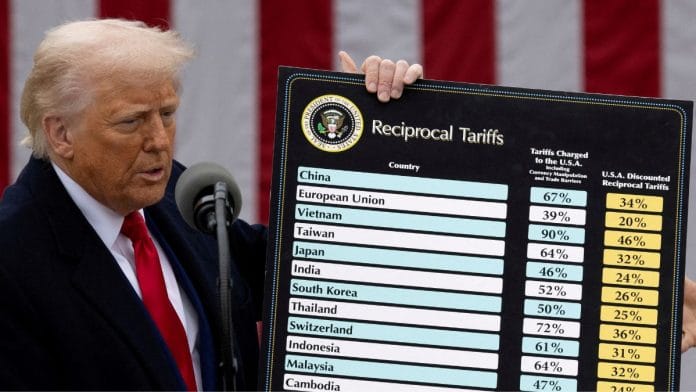New Delhi: The US’ punitive tariffs, including 27 percent on Indian goods and up to 104 percent on Chinese imports, have come into effect Wednesday, while New Delhi races to conclude negotiations for a bilateral trade deal at the earliest.
At a hearing of the Senate Finance Committee Tuesday, the US Trade Representative Jamieson Greer said that the tariffs imposed by President Donald Trump “are aimed squarely at achieving reciprocity and reducing our massive trade deficit, and to reshore production in the United States”.
He added: “Our average tariff on agricultural goods is five percent, but India’s average tariff is 39 percent…The present strategy is bearing fruit…Nearly 50 countries have approached me personally to discuss the President’s new policy, and to explore how to achieve reciprocity…Several of these countries such as Argentina, Vietnam, India and Israel have suggested they would reduce tariff and non-tariff barriers.”
The tariffs caused markets in Asia to sink during the early trading hours Wednesday. Indian markets remained volatile, with the BSE Sensex ending the day 0.51 percent lower and the NSE NIFTY50 dipping 0.61 percent. The Indian markets have also been spooked by Trump’s latest target—pharmaceutical exports.
Under the 2 April tariff order, pharmaceutical products were left out. But speaking at an event hosted by the National Republican Congressional Committee Tuesday, Trump declared that the next round of tariffs will be announced on pharmaceuticals, which will lead to re-shoring of factories to the US.
India’s pharmaceutical industry relies heavily on the US market, with $8.07 billion worth of pharmaceutical exports seen in the 2023-2024 financial year. Between April 2024 and January 2025, a total $7.45 billion worth of pharmaceutical goods have been exported to the US, according to the Indian Ministry of Commerce and Industry. Pharmaceuticals are India’s third largest goods exported to the US in dollar terms. In FY 2024-2025, exports to the US made up roughly 38 percent of India’s total global pharmaceutical exports.
Also Read: How reciprocal Trump tariffs may impact Indian pharma, and become a bitter pill for the US
India pushes for trade deal
New Delhi has been in negotiations with the US since Prime Minister Narendra Modi’s visit to Washington in February this year for the conclusion of the first tranche of a bilateral trade deal. The two leaders announced that the aim of the negotiations is to complete the deal by autumn of this year.
On Monday, External Affairs Minister S. Jaishankar discussed the trade deal with his American counterpart Marco Rubio in a phone conversation between the two. “Exchanged perspectives on the Indo-Pacific, the Indian Sub-continent, Europe, Middle East/West Asia and the Caribbean. Agreed on the importance of the early conclusion of the Bilateral Trade Agreement,” Jaishankar wrote on X after the phone call.
At the end of March, Brendan Lynch, the US Assistant Trade Representative for South and Central Asia led a delegation to New Delhi for negotiations over four days between 25 March and 29 March.
Both sides agreed to launch sectoral expert level engagements as part of the negotiations at the end of Lynch’s visit. For the US, the major sectors it wishes India to drop its tariffs for include agriculture, liquor and spirits and automobiles. The US’ focus is primarily on exporting agricultural products to India, which Greer highlighted Tuesday during the Senate hearing.
India’s Commerce Minister Piyush Goyal made a trip to the US at the beginning of March to launch the negotiations. However, the ongoing talks have not prevented the imposition of tariffs.
The European Union (EU) has offered to reduce tariffs on industrial goods to zero, while Israel and Vietnam have also promised to reduce tariffs with the US to zero. There has been no clarity from the White House whether these offers would see the US remove its latest tariffs introduced against these countries.
China and Canada are two of the major economies, who have announced retaliatory tariffs. Beijing has vowed to impose tariffs as high as 34 percent on American goods, which are also taking effect after the US tariffs Wednesday, while Ottawa’s 25 percent tariff on certain American auto products have already taken effect.
(Edited by Mannat Chugh)
Also Read: Indian drugmakers relieved as they dodge Trump tariffs but medical devices industry takes a hit






